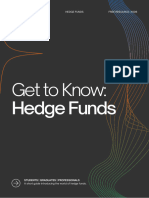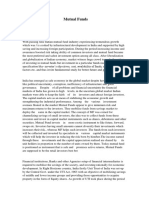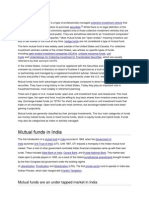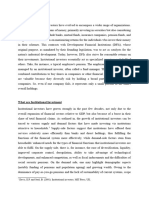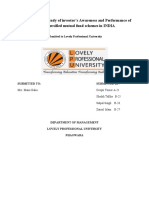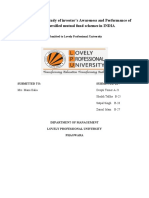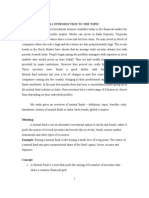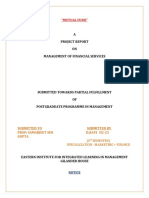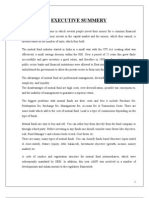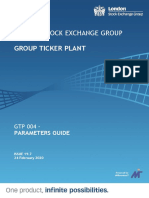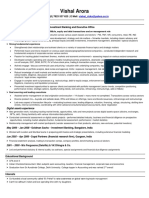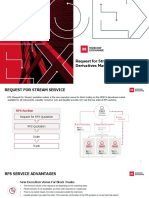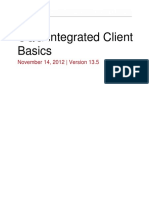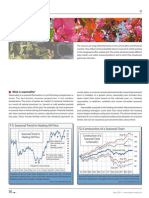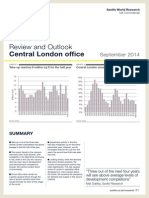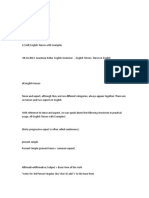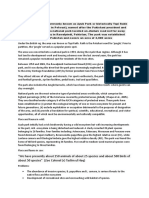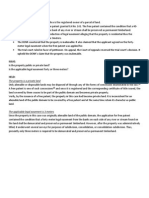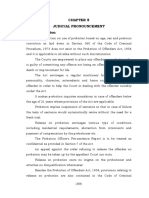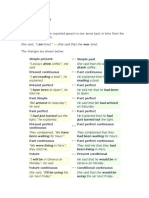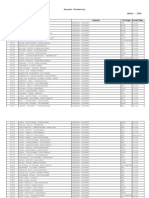HFF Hedge Funds
HFF Hedge Funds
Uploaded by
aba3abaCopyright:
Available Formats
HFF Hedge Funds
HFF Hedge Funds
Uploaded by
aba3abaOriginal Description:
Original Title
Copyright
Available Formats
Share this document
Did you find this document useful?
Is this content inappropriate?
Copyright:
Available Formats
HFF Hedge Funds
HFF Hedge Funds
Uploaded by
aba3abaCopyright:
Available Formats
HEDGE FUNDS:
AN INTRODUCTION
UNDERSTANDING A CRITICAL TOOL IN THE GLOBAL
ECONOMY
What is a hedge fund?
Its a tool that delivers reliable returns for pensions,
university endowments, and others
What is a hedge fund?
Its a tool that creates value to help fund pensions,
universities and non-profits
What is a hedge fund?
Its a tool that institutions and investors
use to manage risk
What is a hedge fund?
Its a tool that helps
diversify investments
5
Simply put:
Its a tool that helps millions meet
their financial goals and obligations
The term hedge fund has been used
to describe private, professionally
managed investment funds since 1949.
Sociologist Alfred Winslow Jones, writing on
assignment for Fortune, bought undervalued
securities and shorted other stocks as a
market neutral approach to investing.
By combining short selling, leverage, and
incentive fees in combination, Jones was
able to deliver solid returns while minimizing
risk. His innovative approach created the first
hedge fund.
While hedge funds have grown in popularity,
their size is relatively small compared to the
markets where they invest.
1
Assets Under
Management
(in trillions)
10,018
9,810
9,575
9,237
9,045
9,284
10,096
9,462
8,661
Total Number of Funds
14.4
3,873
Q3 2013
2012
2011
2010
2009
2008
2007
2006
2005
2000
2.51
1995
1990
610
2,383
13.0
Sources: (1) Hedge Fund Research, Inc., Q3 2013;
(2) Hedge Fund Research, Inc., Q3 2013; (3) FDIC, 3/13, (4) ICI, 12/12
Hedge
U.S.
U.S.
2
Funds Banking Mutual
Industry 3 Fund
Industry 4
Most hedge funds are established as
limited partnerships.
Investors share in the partnerships income, expenses, gains
and losses; each partner is taxed on its respective share
Key Players:
Portfolio
Manager(s)
Determines strategy and is invested in the fund
(compensated based on funds annual performance)
Prime
Broker
Funds must secure their loans with collateral to
gain margin and secure trades. In turn, each broker
(usually a large securities firm) uses its own risk
matrix to determine how much to lend to each of
its clients, acting as a stand-in regulator.
Auditors
Ensure fund compliance; verify financial statements
as required by federal law
9
Typical U.S. Hedge Fund Structure
Auditors and
Administrators
Portfolio Manager
Investors
Prime Broker
Investors
Hedge Fund
Executing Broker
Investors
Investors
Legal Advisors,
Registrar and
Transfer Agent
Source: Hedge Funds and Other Private Funds: Regulation and Compliance Thomson West, 2010
10
Who can invest in hedge funds?
U.S. regulations limit hedge fund
participants to accredited investors
or qualified purchasers.
Individuals with investments in excess of $5
million; or net worth of at least $1 million; or
income of at least $200,000 in last two years
Institutions with total assets over $5 million;
or no less than $25 million in investments or
investable assets
MFA has created an infographic about who can invest in hedge funds and
the due diligence process.
11
Who invests in hedge funds?
About 65 percent of global hedge fund assets come from
institutional investors such as pension funds, and university
and nonprofit endowments.
The rest comes from individual investors.
Source: Preqin Ltd., October 2012
12
Who invests in hedge funds?
University and college endowments were some of the first
institutional investors to partner with hedge funds to help meet
their financial needs and expand educational opportunities
nationwide.
According to a recent NACUBO-Commonfund study,
endowments allocate - on average - 36% of their alternative
asset portfolio to marketable alternative strategies, including
hedge funds.
Hedge funds are of particular importance to larger institutions.
Endowments with over $1 billion in assets allocate an average
of 61% to alternative investments with various hedge fund
managers and strategies.
Source: 2012 NACUBO-Commonfund Study of Endowments
13
Who invests in hedge funds?
Pension plans across the U.S. and around the world invest in
hedge funds to: help diversify their portfolio, manage risk,
and deliver reliable returns over time. These investments
help build retirement security for hundreds of millions of
workers and retirees.
According to a report by Preqin, public and private pension
plans accounted for 38% of institutional investor assets held by
hedge funds as of February 2013.
Source: Preqin Ltd., February 2013
14
Who invests in hedge funds?
Today, the 200 largest investors utilize hedge funds at a
growing rate and continue to increase their investments each
year.
Public Pension Plans
Union Pension Plans
Corporate Pension Plans
Universities
15
Today, the 200 largest U.S. retirement funds
utilize hedge funds at a growing rate.
Their investments total $134.7 billion.
Source: Pensions and Investments, February 2013
16
Why invest in hedge funds?
Hedge funds are important tools for diversification.
They provide investors with the latitude to tailor their
investment strategies based on current market conditions in
order to manage risk and maximize return.
The hedge fund industry is diverse, as well. Over the past
10 years, managers have employed an increasing
number of new investment strategies in increasingly global
markets.
17
Why invest in hedge funds?
Hedge funds offer investors
the ability to diversify and
achieve risk-adjusted returns,
offering protecting in volatile
markets.
In addition, investors also
factor in a number of other
elements that they consider
when evaluating when to
invest in a specific fund or
management team.
Source: Advent Hedge Fund Investor Survey, 09/2013
18
Institutional Trends
In a 2013 Preqin study, 67% of investors said they expect to maintain or
increase their allocation to hedge funds in 2013.
The Robert Wood Johnson Foundation held nearly $1.58 billion in hedge
fund investments at the end of 2012, approximately 17% of total assets.
In 2012, General Motors $68.7 billion pension fund had hedge fund
investments totaling $3.7 billion.
Our increased allocation toward hedge funds in recent years has
lowered the risk exposure of our pension plans while delivering solid
returns. That approach is consistent with our goals to lower GMs risk
profile, strengthen our balance sheet and fully fund our pension plans.
Walter Borst, General Motors Asset Managements CEO, President and
Chief Investment Officer, 2/7/11
Source: 2013 Preqin Global Hedge Fund Outlook;
Robert Wood Johnson Foundation; General Motors
19
How do hedge funds invest?
Global Macro
Investment managers use economic variables and the impact these have
on markets to develop investment strategies.
Managers employ a variety of techniques including discretionary and
systematic analysis, quantitative and fundamental approaches, and long
and short-term holding periods.
Strategies are based on future movements in underlying instruments rather
than the realized valuation discrepancies between securities.
20
How do hedge funds invest?
Event Driven
Investment managers maintain positions in companies currently or
prospectively involved in corporate transactions including mergers,
restructurings, financial distress, tender offers, shareholder buybacks, debt
exchanges, security issuance or other capital structure adjustments.
Managers pursue strategies based on fundamental characteristics (as
opposed to quantitative) and specific future developments.
Position exposure includes a combination of sensitivities to equity markets,
credit markets and company-specific developments.
21
How do hedge funds invest?
Relative Value
Investment managers maintain positions based on valuation discrepancy in
the relationship between multiple securities.
Managers employ a variety of fundamental and quantitative techniques;
investments range broadly across equity, fixed income, derivative or other
security types.
Positions may involve future corporate transactions, but these positions are
predicated on realization of a pricing discrepancy between related securities
rather than the outcome of the corporate transaction.
22
How do hedge funds invest?
Equity Funds
Investment managers maintain long and short positions in equity and equity
derivative securities.
Managers employ a wide variety of techniques to arrive at an investment
decision, including both quantitative and fundamental techniques.
Strategies can be broadly diversified or narrowly focused on specific sectors
and can range broadly in terms of levels of net exposure, leverage employed,
holding period, concentrations of market capitalizations and valuation ranges
of typical portfolios.
23
How do hedge funds invest?
Quantitative Funds
An investment fund that trades positions based on computer models built to
identify investment opportunities.
These models can utilize an unlimited number of variables, which are
programmed into complex, frequently-updated algorithms.
Quantitative funds models are used as a means of executing a number of
other hedge fund strategies.
24
How do hedge funds invest?
Multi-Strategy Funds
Investment managers maintain a variety of processes to arrive at an
investment decision, including both quantitative and fundamental techniques.
Strategies can be broadly diversified or narrowly focused on specific sectors
and can range broadly in terms of levels of net exposure, leverage, holding
period, concentrations of market capitalizations and valuation ranges.
25
How do hedge funds invest?
Managed Futures Trading (CTAs)
Managed futures tradersalso known as commodity trading advisors
(CTAs)are able to invest in up to 150 global futures markets.
They trade in these markets using futures, forwards, and options contracts in
everything from grains and gold, to currencies, stock indexes, and
government bond futures.
Because they can go both long and short they have the ability to make
money in both rising and falling markets.
CTAs have been regulated by the Commodity Futures Trading Commission
(CFTC) since 1974 and are overseen by the National Futures Association
(NFA), a self-regulatory organization.
26
Historically, hedge funds produced
consistently higher returns with
substantially less volatility.
Risk vs. Return
Hennessee Hedge Fund Index vs. Benchmarks
(1987-2012)
Source: Hennessee Group LLC
27
Hedge funds protect on the downside.
Hennessee Index in the Worst 15
Months of S&P Decline (1993-2012)
Source: Hennessee Group LLC
28
Hedge fund managers are partners with
fund investors; their financial interest is
directly linked to fund performance.
Since every hedge fund manager is invested in his or her own fund
(sometimes as much as 80% of the funds value), he or she has a significant
amount of money at stake with every investment decision.
Managers arent rewarded for poor performance. Unlike corporate executives
and mutual funds, managers are only rewarded when investors are
rewarded.
Fee structures vary, though 2 and 20 fees are typical: 2% management fee
for administrative expenses; 20% performance allocation over a specific high
water mark.
29
Hedge funds do not pose a systemic risk:
Their size is small compared to the broader
financial services industry
Hedge funds are not highly leveraged
They arent susceptible to runs
I would not think that any hedge fund or private equity fund would become
a systemically critical firm individually.
Ben Bernanke, Federal Reserve Board Chairman
Testimony to U.S. House Financial Services Committee, October 1, 2009
We conclude that hedge funds do not currently pose systemic risk to the
Australian financial system or the wider economy.
Greg Tanzer, Commissioner, Australian Securities & Investments Commission
Speech Detailing ASIC Report, September 2013
30
Compared to other U.S. markets, there is far
less concentration among hedge funds.
Assets Under Management
(in trillions)
U.S. Bank Holding Companies: Top 5 Hold >60% of Assets
$13.8 trillion
$8.5 trillion
U.S. Mutual Funds: Top 3 Mutual Fund Families Hold >35% of Assets
$4.5 trillion
$11.6 trillion
U.S. Hedge Funds: Top 5 Hold < 9% of Assets
$2.51 trillion
$223.6 billion
Source: FFIEC, 12/31/2011; Bloomberg News, 2/15/12; fund websites, Hedge Fund Research, Q3 2013;
Absolute Return Billion Dollar Club, 09/2013
31
Hedge funds leverage risk is low.
Hedge fund leverage is governed largely by private relationships
with its prime brokers. A fund posts collateral with this prime
broker to secure its trades and the broker uses its own risk
matrix to determine how much to lend.
At Height of Financial Crisis
Hedge Funds
Investment
Banks
Hedge Funds
Investment Banks
1 : 2.5(1)
1 : 9.35(2)
1 : 1.41
1 : 69.5
(1) Credit Suisse U.S. Monthly Chartbook, July 2013
(2) bankregdata.org, Q2 2013
32
Since hedge funds have long lead times
to return capital to investors and to adjust
credit agreements with creditors, they are
not susceptible to runs on capital.
Other
Institutions
Hedge
Funds
Equity
Mutual funds must be
able to return capital to
investors immediately
By contract, most hedge
funds return capital over
months or years
Debt
Banks rely on daily
liquidity from deposits
and commercial paper to
meet depositor demands
Hedge funds credit
agreements with prime
brokers are set for 30 days
but can extend to two years
33
Resources:
To download this presentation as a PDF, please click here
http://www.hedgefundfundamentals.com/wpcontent/uploads/2012/09/Hedge-Funds-101.pdf
For more information, please visit
www.hedgefundfundamentals.com
34
You might also like
- Project Report On HDFC Mutual FundsDocument66 pagesProject Report On HDFC Mutual FundsPrince Maurya67% (3)
- Perfomance of Mutual Funds-India BullsDocument105 pagesPerfomance of Mutual Funds-India BullskartikNo ratings yet
- Hedge Funds - Presenatation Final OneDocument22 pagesHedge Funds - Presenatation Final OneSachin YadavNo ratings yet
- Masque of Red Death Question SheetDocument3 pagesMasque of Red Death Question SheetlauramariesandersNo ratings yet
- Interchange 1 Unit 11Document11 pagesInterchange 1 Unit 11Mara Silveira Dias33% (3)
- Industry Study of Engineered Bamboo: For Internal Use Onlyfor Internal Use OnlyDocument61 pagesIndustry Study of Engineered Bamboo: For Internal Use Onlyfor Internal Use OnlyPrince JunieboyNo ratings yet
- An Introduction To Hedge Funds: Pictet Alternative InvestmentsDocument16 pagesAn Introduction To Hedge Funds: Pictet Alternative InvestmentsGauravMunjalNo ratings yet
- Hedge Funds ProjectDocument8 pagesHedge Funds ProjectAyesha PattnaikNo ratings yet
- Portfolio Management and Capital MarketDocument7 pagesPortfolio Management and Capital MarketHuzaifa AshNo ratings yet
- Hedge Funds - in Emerging MarketsDocument75 pagesHedge Funds - in Emerging MarketsDipesh JainNo ratings yet
- Mutual Fund - A Study of Investor's Awareness and Performance of Equity Diversified Mutual Fund Schemes in INDIADocument25 pagesMutual Fund - A Study of Investor's Awareness and Performance of Equity Diversified Mutual Fund Schemes in INDIAaamritaaNo ratings yet
- Chapter - I Mutual Funds in IndiaDocument28 pagesChapter - I Mutual Funds in India1986anuNo ratings yet
- GROUP 4 - Risk Management and Hedge Funds-1Document6 pagesGROUP 4 - Risk Management and Hedge Funds-1anubhavsaxenabchb20No ratings yet
- Hedge Funds - Free Guide #006Document11 pagesHedge Funds - Free Guide #006katrams010No ratings yet
- LinkDocument25 pagesLinkchandan chNo ratings yet
- PGDM Finance Project-1Document61 pagesPGDM Finance Project-1Rahul JadhavNo ratings yet
- Hedge FundsDocument59 pagesHedge FundsjinalvikamseyNo ratings yet
- Synopsis EditedDocument13 pagesSynopsis EditedVivek RohillaNo ratings yet
- Mutual Fund: Mutual Funds in IndiaDocument12 pagesMutual Fund: Mutual Funds in IndiaNirali AntaniNo ratings yet
- Synopsis IDocument21 pagesSynopsis Iankurk124No ratings yet
- Home Log in Sign UpDocument7 pagesHome Log in Sign UpPooja AgarwalNo ratings yet
- Executive Summary: Need of The StudyDocument68 pagesExecutive Summary: Need of The StudytripathirajeshblyNo ratings yet
- Chapter 1: Introduction: 1.1 BackgroundDocument34 pagesChapter 1: Introduction: 1.1 Backgroundkritika agarwalNo ratings yet
- Chapter-1: Comperative Statement Analasis of Mutul FundsDocument101 pagesChapter-1: Comperative Statement Analasis of Mutul FundsVeeravalli AparnaNo ratings yet
- Final Publish Paper ABDocument15 pagesFinal Publish Paper ABJayesh AdakmolNo ratings yet
- 404 Mutual Fund OperationsDocument9 pages404 Mutual Fund Operationsghogaretanmay21No ratings yet
- Part BDocument43 pagesPart BrameshncNo ratings yet
- IFS PresentationDocument18 pagesIFS Presentationsamarpanchaudhary359No ratings yet
- Portfolio Management ServicesDocument83 pagesPortfolio Management Servicesragipanidinesh6206No ratings yet
- Mutual Funds Industry in India: A Project ReportDocument30 pagesMutual Funds Industry in India: A Project Reportshruti5391No ratings yet
- What Are Institutional InvestmentDocument13 pagesWhat Are Institutional Investmentdivyanshi sethiNo ratings yet
- What Does An Investor DoDocument10 pagesWhat Does An Investor DoMansurNo ratings yet
- A Project Report On Comparative Analysis Ulip Vs Mutual Funds - NetworthDocument72 pagesA Project Report On Comparative Analysis Ulip Vs Mutual Funds - NetworthNagireddy Kalluri86% (7)
- IntroductionDocument28 pagesIntroductionShashank JhingranNo ratings yet
- Mutual Fund Analysis g4dDocument46 pagesMutual Fund Analysis g4dVijetha EdduNo ratings yet
- New Vicky ProjectDocument84 pagesNew Vicky Project21UGDF005 Akhΐl.KNo ratings yet
- Capstone Project G-21Document23 pagesCapstone Project G-21Satpal SinghNo ratings yet
- Varun Wealth MGMTDocument5 pagesVarun Wealth MGMTVaibhav ShahNo ratings yet
- Mutual Fund - A Study of Investor's Awareness and Performance of Equity Diversified Mutual Fund Schemes in INDIADocument24 pagesMutual Fund - A Study of Investor's Awareness and Performance of Equity Diversified Mutual Fund Schemes in INDIAZainul IslamNo ratings yet
- Project Synopsis On Mutual Fund - Mahesh RahejaDocument16 pagesProject Synopsis On Mutual Fund - Mahesh RahejaRajiv KumarNo ratings yet
- Chapter No.1Document38 pagesChapter No.1ffNo ratings yet
- 1.1 Introduction To The TopicDocument92 pages1.1 Introduction To The TopicNithya Devi ANo ratings yet
- Benefits of Mutual FundsDocument5 pagesBenefits of Mutual FundschitkarashellyNo ratings yet
- FMS Unit4Document21 pagesFMS Unit4Manikant Eswar ReddyNo ratings yet
- Chapter 1Document15 pagesChapter 1Harry HaranNo ratings yet
- PRC2Document77 pagesPRC2Manipatruni Sai ManojNo ratings yet
- Mutual FundsDocument58 pagesMutual Fundsrishi kumbhatNo ratings yet
- Financial Brokerage AspectsDocument18 pagesFinancial Brokerage AspectsRavi ChandranNo ratings yet
- Los: 40 Portfolio Management: An Overview: A Portfolio Perspective On InvestingDocument2 pagesLos: 40 Portfolio Management: An Overview: A Portfolio Perspective On InvestingArpit MaheshwariNo ratings yet
- The Financial Kaleidoscope - August 19Document8 pagesThe Financial Kaleidoscope - August 19Omveer SinghNo ratings yet
- mutual funds pptDocument12 pagesmutual funds pptMiniMot GamingNo ratings yet
- Investment Perception and Selection Behaviour Towards Mutual FundDocument11 pagesInvestment Perception and Selection Behaviour Towards Mutual FundmmmmmNo ratings yet
- Basics of Mutual FundsDocument13 pagesBasics of Mutual FundsHemant KumarNo ratings yet
- Mutual Funds Question Bank SolutionsDocument12 pagesMutual Funds Question Bank Solutionsmayankmehul12No ratings yet
- Mutual-Fund (NAV) ProjectDocument51 pagesMutual-Fund (NAV) ProjectyogichaiNo ratings yet
- DFFFFDocument61 pagesDFFFFGaurav JaiswalNo ratings yet
- Mutual FundsDocument94 pagesMutual FundsraghavbansalNo ratings yet
- MBA Project - Synopsis, Assignment Final Semestar, Study at Mutaual Funds at HDFCDocument69 pagesMBA Project - Synopsis, Assignment Final Semestar, Study at Mutaual Funds at HDFCmuneebalriyazNo ratings yet
- Mutual Funds: Theoritical BackgroundDocument25 pagesMutual Funds: Theoritical BackgroundnagpalanishNo ratings yet
- Mutual FundsDocument12 pagesMutual FundsGulshan JangidNo ratings yet
- How Beginners Achieve Financial Success: A Guide to Understanding Risk and ReturnFrom EverandHow Beginners Achieve Financial Success: A Guide to Understanding Risk and ReturnNo ratings yet
- Vdocument - in - London Stock Exchange Group 2020 02 25 Connectivity CMC Exchange HostingDocument38 pagesVdocument - in - London Stock Exchange Group 2020 02 25 Connectivity CMC Exchange Hostingaba3abaNo ratings yet
- MiFID Refit - Euronext High Level Positions On Equities Market Structure FINALDocument2 pagesMiFID Refit - Euronext High Level Positions On Equities Market Structure FINALaba3abaNo ratings yet
- Vishal Arora (DA)Document1 pageVishal Arora (DA)aba3abaNo ratings yet
- Brokers On The Run: InsightsDocument3 pagesBrokers On The Run: Insightsaba3abaNo ratings yet
- Coaching The Inner-Game of Trading: Monika MüllerDocument7 pagesCoaching The Inner-Game of Trading: Monika Mülleraba3abaNo ratings yet
- Rfs Eng 1Document14 pagesRfs Eng 1aba3abaNo ratings yet
- 2 Vector Spaces: V V V VDocument7 pages2 Vector Spaces: V V V Vaba3abaNo ratings yet
- All CQGIC UGs PDFDocument1,840 pagesAll CQGIC UGs PDFaba3abaNo ratings yet
- Technical Analysis For Beginners: by Emilio TomasiniDocument16 pagesTechnical Analysis For Beginners: by Emilio Tomasiniaba3abaNo ratings yet
- Saisonalitaet eDocument5 pagesSaisonalitaet ephilippepssb2No ratings yet
- Simplicity Is BestDocument7 pagesSimplicity Is Bestaba3aba100% (1)
- 2005trading Parabolic TrendsDocument4 pages2005trading Parabolic Trendsaba3abaNo ratings yet
- London Infrastructure Spotlight London InfrastructureDocument8 pagesLondon Infrastructure Spotlight London Infrastructureaba3abaNo ratings yet
- Spotlight: Key Themes For UK Real Estate in 2014Document6 pagesSpotlight: Key Themes For UK Real Estate in 2014aba3abaNo ratings yet
- LA Sheet2 12Document1 pageLA Sheet2 12aba3abaNo ratings yet
- Commercial Research Central London OfficesDocument8 pagesCommercial Research Central London Officesaba3abaNo ratings yet
- CQG API BrochureDocument4 pagesCQG API Brochureaba3abaNo ratings yet
- Prelims Linear Algebra I: 1.1 Addition and Scalar Multiplication of MatricesDocument11 pagesPrelims Linear Algebra I: 1.1 Addition and Scalar Multiplication of Matricesaba3abaNo ratings yet
- 4 Sums, Intersections and Direct Sums of Subspaces: 4.1 A Dimension FormulaDocument3 pages4 Sums, Intersections and Direct Sums of Subspaces: 4.1 A Dimension Formulaaba3abaNo ratings yet
- Department For Transport (DFT) (2007) Low Carbon Transport Innovation StrategyDocument87 pagesDepartment For Transport (DFT) (2007) Low Carbon Transport Innovation StrategyAkos BrandeckerNo ratings yet
- Judgement Writting Appreciation of Evidences Test AnswerDocument3 pagesJudgement Writting Appreciation of Evidences Test Answermaheswarir731No ratings yet
- All 12 TensesDocument19 pagesAll 12 TensesJojo LeaonNo ratings yet
- 2nd Book Marty's JobDocument12 pages2nd Book Marty's JobAMMIVA CENTERNo ratings yet
- Vaastu in ComeDocument2 pagesVaastu in Comeish himpalNo ratings yet
- Adults Final TestDocument2 pagesAdults Final TesttutycandeNo ratings yet
- Corp Law Her BosaDocument7 pagesCorp Law Her BosaMigs GayaresNo ratings yet
- Write Complaint Letters That Get ResultsDocument5 pagesWrite Complaint Letters That Get ResultsSamy RajooNo ratings yet
- Subhamsharaffflipkart 190214071150Document51 pagesSubhamsharaffflipkart 190214071150manoj kumar DasNo ratings yet
- "We Have Presently About 150 Animals of About 25 Species and About 500 Birds of About 50 Species" (Zoo Colonel (R) Taslim Ul Haq)Document2 pages"We Have Presently About 150 Animals of About 25 Species and About 500 Birds of About 50 Species" (Zoo Colonel (R) Taslim Ul Haq)QuratulAin AnsariNo ratings yet
- Maximilien Robespierre: Lawyer, PoliticianDocument2 pagesMaximilien Robespierre: Lawyer, PoliticianSUMIT SINGH RAJPUTNo ratings yet
- Land Titles - Oliva VS RepublicDocument1 pageLand Titles - Oliva VS RepublicShine BillonesNo ratings yet
- Market Watch Malaysia 2010 Construction IndustryDocument12 pagesMarket Watch Malaysia 2010 Construction Industrybrekk27No ratings yet
- Mentoring: Employee Onboarding ProcessDocument9 pagesMentoring: Employee Onboarding ProcessEvie DeriaNo ratings yet
- Judicial PronouncementDocument69 pagesJudicial PronouncementmanasranNo ratings yet
- Gospel and Bengal CultureDocument17 pagesGospel and Bengal Culturesomdatta.sarkarNo ratings yet
- Analysis of "The Cruel Mother" BalladDocument7 pagesAnalysis of "The Cruel Mother" BalladDustin Doss100% (1)
- Indain Evidence Act MCQDocument24 pagesIndain Evidence Act MCQharjeet76No ratings yet
- United States Court of Appeals, Eleventh CircuitDocument13 pagesUnited States Court of Appeals, Eleventh CircuitScribd Government DocsNo ratings yet
- Literature Review On Female FoeticideDocument4 pagesLiterature Review On Female Foeticidec5nqw54q100% (1)
- Physics of Faith, T.S. Tikhoplav, V. TikhoplavDocument117 pagesPhysics of Faith, T.S. Tikhoplav, V. TikhoplavCalhounNo ratings yet
- Model Pengelolaan PesisirDocument20 pagesModel Pengelolaan PesisirLanang TanuNo ratings yet
- Reported SpeechDocument2 pagesReported SpeechAdrian MăgheruşanNo ratings yet
- Book Review of No Future Without Forgiveness 1Document9 pagesBook Review of No Future Without Forgiveness 1ibrahimNo ratings yet
- Gujarat University Exam: M.S. April - 2020Document6 pagesGujarat University Exam: M.S. April - 2020SaumilNo ratings yet
- Dashaka 82 Home Dashaka 84Document11 pagesDashaka 82 Home Dashaka 84vinithaanandNo ratings yet
- QuantifierDocument28 pagesQuantifierjosenato1970No ratings yet













